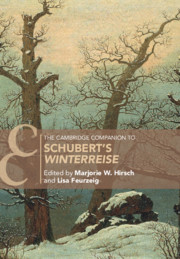Book contents
- The Cambridge Companion to Schubert’s Winterreise
- Cambridge Companions to Music
- The Cambridge Companion to Schubert’s Winterreise
- Copyright page
- Dedication
- Contents
- Figures
- Tables
- Music Examples
- Contributors
- Acknowledgments
- Note on Pitch
- Chronology
- Abbreviations
- Introduction: An Endless Winter Journey
- Part I Schubert’s Winterreise and Its Musical Heritage
- Part II Die Winterreise: Poetic Cycle
- Part III Cultural and Historical Contexts
- Part IV Winterreise: Song Cycle
- Part V Winterreise After 1827
- Appendix
- Guide to Further Reading
- Index
Introduction: An Endless Winter Journey
Published online by Cambridge University Press: 02 February 2021
- The Cambridge Companion to Schubert’s Winterreise
- Cambridge Companions to Music
- The Cambridge Companion to Schubert’s Winterreise
- Copyright page
- Dedication
- Contents
- Figures
- Tables
- Music Examples
- Contributors
- Acknowledgments
- Note on Pitch
- Chronology
- Abbreviations
- Introduction: An Endless Winter Journey
- Part I Schubert’s Winterreise and Its Musical Heritage
- Part II Die Winterreise: Poetic Cycle
- Part III Cultural and Historical Contexts
- Part IV Winterreise: Song Cycle
- Part V Winterreise After 1827
- Appendix
- Guide to Further Reading
- Index
Summary
“I like these songs more than all the rest, and you will come to like them as well,” Franz Schubert reportedly declared upon first singing through his haunting new song cycle Winterreise (D911) to a few close friends. The first half of the statement is remarkable given that by 1827, the year in which this intimate premiere took place, Schubert had already composed over 550 Lieder, including countless gems. His claim to prefer these “horrifying” new songs depicting a solitary wanderer’s alienation, disorientation, and despair suffered amidst a bleak, frigid landscape bespeaks a deep personal attachment to the cycle. Composing the work had been taxing, as indicated by the numerous cross-outs, rewritings, and insertions in portions of the autograph manuscript, and Schubert was plainly proud of his accomplishment. In asserting “I like these songs more than all the rest,” he may have intended to steer his friends toward a positive assessment of the cycle, to reassure them that it was not merely the regrettable creation of a disturbed mind.
- Type
- Chapter
- Information
- Publisher: Cambridge University PressPrint publication year: 2021

